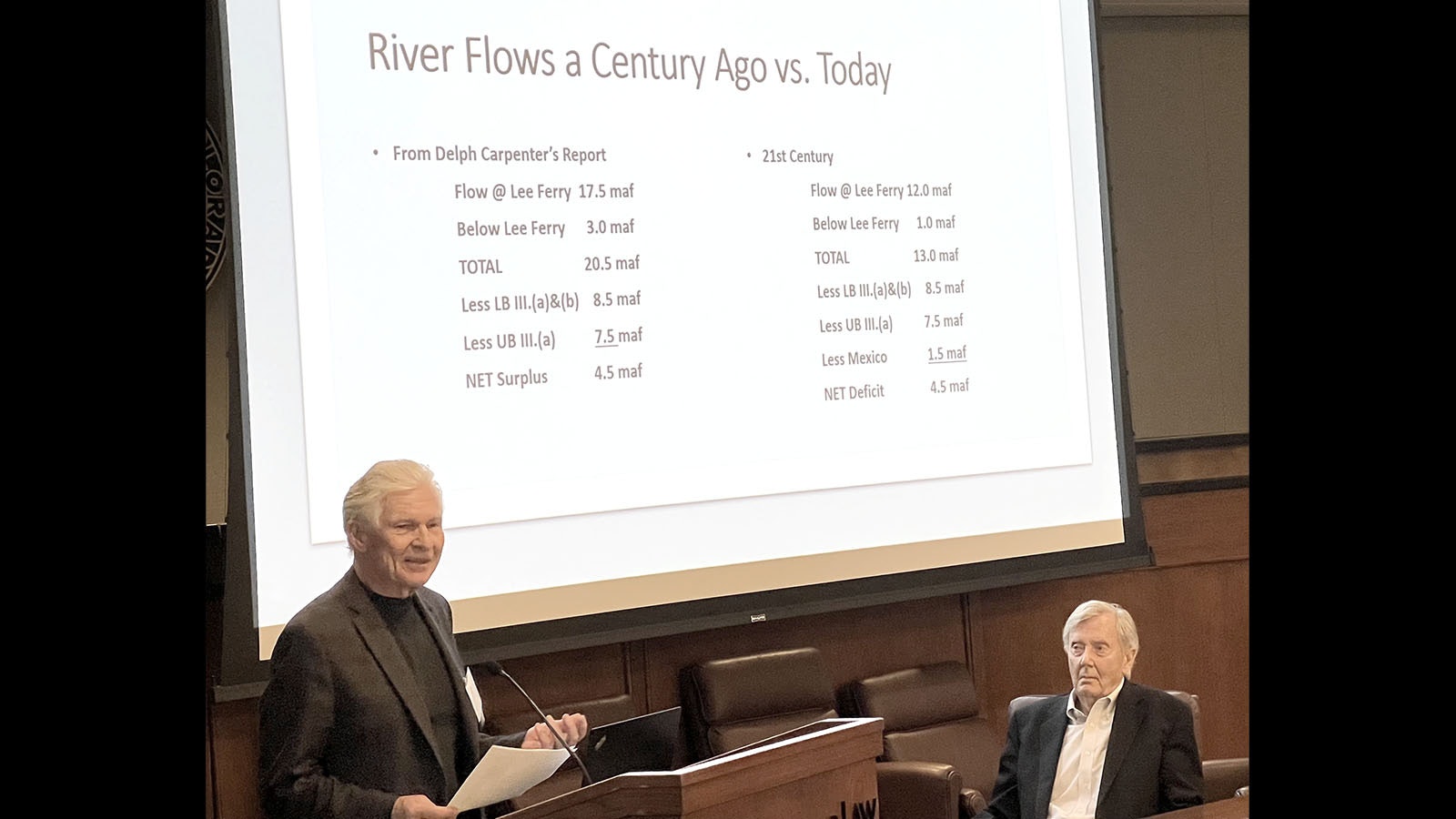BOULDER, Colo. — Flows in the Colorado River have declined by roughly 20% since 2000, leaving Upper Basin states, including Wyoming, on the short end of the 1922 Colorado River Compact, says former U.S. Interior Secretary Bruce Babbitt.
Flows are expected to drop even more, Babbitt added.
That means the expectations that Upper Basin states deliver 75 million acre-feet of the water every decade to the Lower Colorado River Basin are increasingly unrealistic. An acre foot is the amount of water that would cover an acre of land to the depth of a foot.
“The delivery requirement against those projections (of) water use in the Upper Basin,” said Babbitt, who is also a former Arizona governor.
Babbitt spoke Friday during the “Crisis on the Colorado River” conference in Boulder, Colorado. He and Eric Kuhn, former general manager of the Colorado River District, gave a presentation titled “Thinking About A Sustainable Future.”
Not The River Of 1922
Babbitt wasn’t popular in Wyoming during his tenure as Interior secretary under the Clinton administration. He was regarded as having started the “War on the West” by making hostile statements toward ranchers, loggers and miners.
Even so, on Friday he acknowledged the plight of the Upper Basin states — which include Wyoming, Colorado, Utah and New Mexico — under their obligations under the 1922 Colorado River Compact.
The compact made sense when it was implemented and “there was plenty of water to go around,” he said.
However, the conditions of the compact have become ambiguous under current circumstances. That’s causing conflict between the Upper Basin and Lower Basin, which includes Arizona, California, Nevada and Mexico.
As the last in line on the Colorado River, Mexico is entitled to 1.5 million acre-feet each year under the compact, said Kuhn said. That wasn’t much in 1922, but it’s become a significant portion as demand on the river has grown.
The total yearly flow of the Colorado River in 1922 was 20.5 million acre-feet, compared to roughly 13 million acre-feet today,” he said.

Tribes Must Have A Voice
Echoing what Native American tribal leaders said during the conference, Babbitt said the tribes must have a full voice as sovereign entities in the discussion over the river’s future. As much as 25% of Colorado River water rights belong to the tribes, but that’s never been fully delivered to them.
“You can’t just go to the tribes and say, ‘We want to lease your water,’” Babbitt said. “They’re not in the business of getting (water right) entitlements just to give them away.”
Wyoming Water Effort
Wyoming lawmakers recognizing the vulnerability the Cowboy State has in being home to the headwaters of the Colorado River attempted to find a way to get a seat at the table as the river compact is debated.
A bill was proposed in this year’s session that would have created a Colorado River Authority board for Wyoming. The bill didn’t go anywhere, but it outlined concerns some in the state have about the water crisis downriver.
Interior Department Needs To Step Up
Babbitt said that his former charge, the U.S. Department of the Interior, hasn’t done enough to learn the needs of water users or to get them talking with each other.
Negotiations and cooperation worked well with Native American tribes and other entities along the Gila River Basin in Arizona, he said, and that could be a template for how to soothe water fights along the Colorado River.
The tribes, municipal governments and others negotiated a settlement based on water exchanges and the like, Babbitt said, which helped immensely in conserving the Gila River water.
“Almost every city, village and irrigation district in central Arizona” signed on to the agreement, he said.
Kuhn agreed that negotiations and cooperation will do more going forward than fighting and litigation over shrinking Colorado River supplies.
He again questioned the relevancy of the 1922 Colorado River Compact, saying that it might be better to distribute water on a yearly basis according to “percentages of what’s available” rather than the fixed amounts set through the compact.
Mark Heinz can be reached at mark@cowboystatedaily.com.





